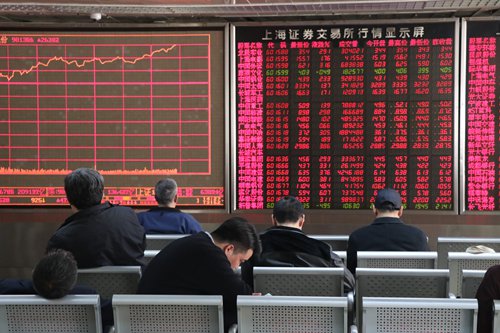SOURCE / MARKETS
Tougher penalties will help safeguard investors' interests: experts
Securities Law revisions to ‘ease market access’

Individual investors at a branch of China Securities on Dongzhimen South Street, Beijing Photo: Li Qiaoyi/GT
The latest revision to China's Securities Law, which aims to improve the conditions for securities issuance and tighten regulation of illegal trading, will help promote the reform of the country's registration-based IPO system and further drive the mature growth of the A-share market, experts said on Monday.The revision also showed China's efforts to further open up to foreign capital, from high-tech and emerging industries in particular, they noted.
A draft amendment to China's Securities Law had a fourth reading on Monday at the ongoing session of the Standing Committee of the National People's Congress, China's top legislature. The revisions came eight months after the previous reading in April.
The draft amendment aims to simplify and optimize the conditions for securities issuance as it changes the IPO requirement from stating that companies issuing shares should have "the ability to continuously make profit" to "the ability to continuously run operations," news site sina.com.cn reported.
The revisions will do much to ease the market access for domestic and foreign capital and attract more companies from high-tech or emerging industries, Yang Delong, chief economist at Shenzhen-based First Seafront Fund Management, told the Global Times on Monday.
Li Daxiao, chief economist at Shenzhen-based Yingda Securities, agreed, saying that the revised law will be conducive to the development of the STAR Market, China's Science and Technology Innovation Board, and will promote securities trading so that it better serves China's economy.
The launch of the STAR Market in Shanghai in July gave rise to the need for a revised Securities Law to manage the new market's practices and also drive the reform of the country's registration-based IPO system, experts said.
The Securities Law was enacted in the 1990s and the capital market in China has changed drastically since then, Yang said, noting that the revisions would bring the rules up to date for a fast-changing market.
"It is paving the way for the A-share market to mature," Yang noted.
Nowadays, foreign capital accounts for merely 2 percent in the Chinese capital market, and the percentage is expected to grow to about 20 percent as the domestic market further develops, Li said, noting that the law would help accelerate the process.
Another major highlight for the fourth reading is the tougher penalties for illegal securities activities. Illegal income derived from illegal actions in the securities market will be confiscated, according to a report by chinanews.com.
Other details include an increase of the amount of administrative fines - if the fines are calculated based on illegal income, the standard penalty will be increased from the current range of one to five times to a range of one to ten times, said the report.
The fixed penalty will be raised from the previous range of 300,000 yuan ($42,801) to 600,000 yuan to a maximum range of 2 million yuan to 20 million yuan.
It is vital to raise the cost of illegal securities trading through revising the law because some fraud can be found in the A-share market, Yang said.
Tougher penalties will help safeguard the rights and interests of small and medium-sized investors, Li noted.
The State Council, China's cabinet, is scheduled to finish the change of the domestic stock listing system from approval-based to registration-based by February 29, 2020.
